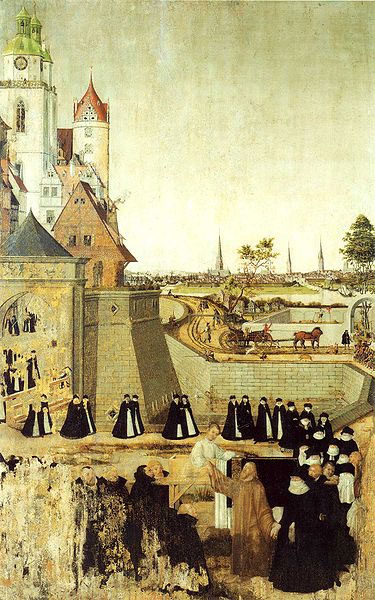Do Not Weep
The Unexpected Luck of Widows’ Sons
A guest post by Luke Welch.
I’ve been reading The Hobbit again, out loud, to our children, and this time through, one phrase in the first chapter caught my attention.
When Bilbo first encounters Gandalf as an adult, he exhales a list of memories of the greatness and fearful unpredictability of the old wizard:
Not the wandering wizard that gave Old Took a pair of magic diamond studs that fastened themselves and never came undone till ordered? Not the fellow who used to tell such wonderful tales at parties, about dragons and goblins and giants and the rescue of princesses and the unexpected luck of widows’ sons? (The Hobbit, Chapter 1).
In the Bible, there are two widows who received their sons from the dead: the widow of Zarephath (1 Kings 17), and the widow of Nain (Luke 7). In both cases, a visit by a prophet results in the resurrection of the widow’s only son. In both cases, the miracle vindicates the prophet, resulting in a confession, a testimony, that the prophet is God’s man indeed.
A prophet
…..visits
……….the “displaced” widow
……….whose son dies or is dead;
……………The prophet performs a miracle
……….and raises the son to life;
……….which brings a testimony
…..of the vindication
of the prophet. [1]
The importance of the vindication of the prophet is often overlooked. Here are the announcements from both stories:
And Elijah took the child and brought him down from the upper chamber into the house and delivered him to his mother. And Elijah said, “See, your son lives.” And the woman said to Elijah, “Now I know that you are a man of God, and that the word of the Lord in your mouth is truth.” (1 Kings 17:24)
And the dead man sat up and began to speak, and Jesus gave him to his mother. Fear seized them all, and they glorified God, saying, “A great prophet has arisen among us!” and “God has visited his people!” (Luke 7:15-16)
Resurrection is extraordinary, and therefore entirely unexpected. It is incredible except for those who have witnessed it first-hand. And when it does occur, it reveals that the prophet is under the power of the Spirit of God and confirms his God-given authority to speak for God to the people of God.
Of course, there is another historical resurrection which follows the same pattern.
Jesus was the “only Son” of a widow, Mary. It is likely that Joseph died before Jesus’ baptism. From the beginning of His ministry, at His first miracle (turning water into wine in John 4), Mary treats Jesus as the “man of the house.” While on the cross, Jesus delegates His Covenant responsibility to shelter Mary. He passes it to the next believing man of the family, His younger cousin John, son of Zebedee (John 19.26-27).
Then, her son, her only son, is killed by God (cf. 1 Kings 17:20, Isaiah 53:10).
And so Jesus is resurrected, and Mary receives back her dead.
That leaves us with a question. What does this say about the prophet? Elijah was known to be the Spirit’s mouth because of the resurrection he received through prayer. Jesus was known to be the Great Prophet rising up among the people, because he gave resurrection. But who resurrected Jesus?
It was the Holy Spirit himself (Romans 1:4). Of course, we hear from Paul later on that the resurrection of Jesus was a Trinitarian act (cf. Romans 8:11ff). But even there, the Power of the Holy Spirit is what is emphasized in this life-giving to dead sons.
So, in Mary’s receiving back her dead, we are justified in looking for a testimony, a vindication, of that Prophet. The next great prophetic voice was that of the Spirit in the testimony of Jesus. He was in the apostles, as eyewitnesses to the resurrection. They vindicated Jesus, and history continues to vindicate them. The Spirit is the jar of holy oil that never runs out.
_______________________________
[1] Mike Bull: I’ve expanded a little on Luke’s original outline here, to bring out the echo of the Ten Commandments: Word from God, alienation from the Land, mother and father, knife and fire, theft/gift and true witness, and finally, shelter and sheltered. Concerning the alienation from the Land, “The location of the miracle in Nain is also possibly an allusion to the raising of the Shunamite woman’s son by Elisha because Nain is only a couple of miles north of Shunem (cf. 2Ki 4:). So the event and location are both allusions to Elijah and Elisha.” [bible.org] The prophets ministered to those outside of Israel to provoke Israel to jealousy.


























